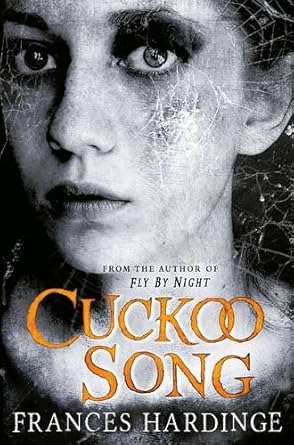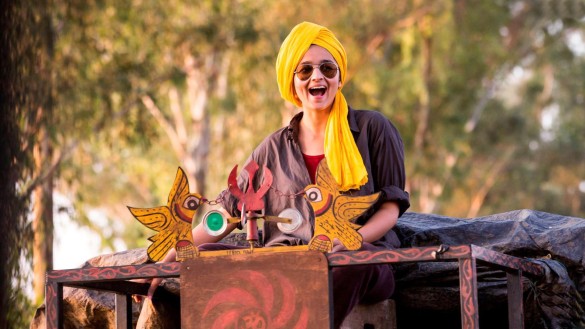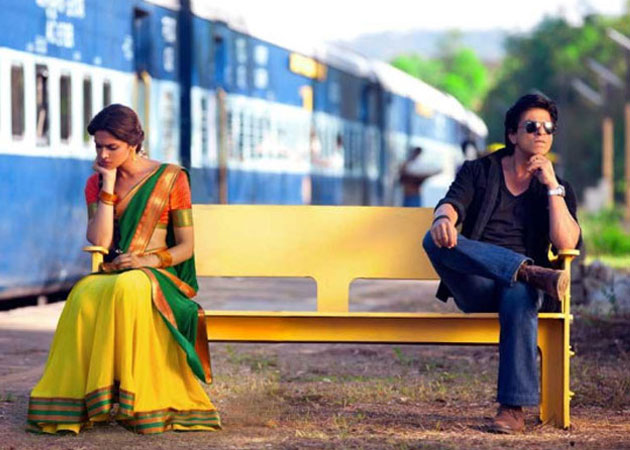I've bought a Kindle and against all the odds I'm loving it. Easy to use, easy to sit with the Kindle in one hand and write notes with the other wherever I'm sat. I've also signed up with NetGalley to help with the day job and so I can blog more. The first advance copy I've read is Frances Hardinge's new novel Cuckoo Song (Pan MacMillan), out on 8th May.


I’d read three of
Frances Hardinge’s novels up till now – Fly
By Night, Twilight Robbery and A Face Like Glass. More than anything
else reading a Hardinge novel is deeply pleasurable - on every page you’ll find
a sentence, a figure of speech, a line of dialogue, a joke, an observation or a
brilliant idea that will give you pause for thought or astonish. Moreover her characters
aren’t inherently good or evil, motivated by abstract ideas, intent on world
domination or driven by ‘destiny’; rather they exist in worlds - the Fractured
Realm and Carverna - with traditions and social conventions we can recognise
and where laws, institutions and ideology put fetters on people’s imaginations,
happiness and freedoms. Her characters have political, economic and social
motives. Struggles for power or money, self-preservation and idealism are all
at the heart of her plots. Hardinge brings sophistication and literariness to
children’s fiction whilst never skimping on the entertainment and satisfaction
quotient.
Her new novel Cuckoo Song is different. It doesn’t have the same huge canvas or
extraordinary feats of world-building as the other novels but is instead rooted
in 1920s Britain. Aptly, in this centenary year, it’s a story about World War 1
and its aftermath as the social mores and attitudes of Britain began to be
questioned and transformed. That makes Cuckoo
Song’s canvas, without wanting to sound too grandiose, modernity and I’m
happy to report Hardinge is up to the different kind of task she has set
herself. It’s a dark, potent and heady tale of doubles and doppelgangers,
monsters and mayhem, courage and conviction. I loved it and am still a little giddy and
euphoric over it. Readers Cuckoo Song
is the bee’s knees.
Triss wakes up ill
and discombobulated; she can’t really remember what has happened. Her mother
and father, Celeste and Piers Crescent are in the room to reassure her. She has
fallen into a large pond and become feverish. They reassure her that her
memories will fully recover as she regains her strength. More puzzling is the
reaction of her younger sister Pen who seems to hate and distrust Triss to an
extraordinary degree. The reader finds it hard to understand why however – the
narrator keeps very close to Triss so that we appreciate her kindness and
honesty. However the novel quickly becomes mysterious, eerie and horrific. The
first sign is food. Triss is hungry and Hardinge describes her first meal as
something straight out of classic children’s literature – hearty, wholesome and
delicious. Later that night Triss wakes up famished. She spies the apples on
the tree outside her window and sneaks out to eat. She is ravenous:
She snatched at
them, tearing them from their stems and cramming them into her mouth one by
one, feeling her teeth cleave into them with a shuddering relief. They were
unripe and so sharp that her tongue went numb, but she did not care . . . she
dropped to all fours and scrabbled at the early windfalls. Some were recent,
merely speckled with rot, others caramel coloured and slack, riddled with
insect holes. Their pulp squeezed between her fingers as she caught them up and
crammed them into her mouth. They were sweet and bitter and mushy in all the
wrong ways and she did not care.
The first quarter of
the novel is an uneasy read as Triss questions her sanity and becomes
increasingly uncertain and fearful. Hardinge plays this particular literary
game with aplomb so that it feels true and convincing rather than manufactured
– how much is real? How much is Triss imagining. What is really happening? In
fact this first quarter is so successful I wasn’t sure Hardinge would be able
to provide satisfactory answers and still drive the narrative forward. I
shouldn’t have worried. As the story gathers momentum the sense of the uncanny
does slip away a little but becomes instead an adventure with three marvellous
heroines.
The novel is rich, in
associations of all kinds but especially with fairy tales and classic
children’s literature and you’ll think about the way Hardinge is interrogating
various tropes and stereotypes. As is always the case with a Hardinge novel I also
thought of countless things whilst reading, some intended I’m sure and some
purely subjective: Pinocchio, The Box of Delights, the Spanish films
of Guillermo del Toro especially Pan’s
Labyrinth, the novels of Alan Garner, a BBC serial from 1985 starring Susan
Gilmore called Maelstrom – remember the
dolls(!) and much more.
People often focus
on Hardinge’s world building – the incredible dynamism of her worlds, their
social and political authenticity and logic – and her abundance of ideas, but
reviews don’t always acknowledge the depth and quality of her writing. Maybe
they think they’ll turn younger readers off if they extoll her extraordinary
literary skill. Take her similes – I don’t know of anyone that writes similies
with the skill, imagination and range of purpose that Hardinge manages. Her
comparisons capture sensations and moments in time, create a sense of period
and history and generate mood and atmosphere – sometimes you’re astonished by
their accuracy, sometimes by their insight, sometimes by their attentiveness to
detail and exceptional thoughtfulness. They also slow down the reading process
a little because they ask you to reflect and assess, rationalise and discuss.
Maybe this is one of the reasons why Hardinge isn’t read quite as widely as some
of the fast paced, plot dominated novels that populate the YA bestsellers lists.
Are there any negatives
you may be asking? Well, kind of – towards the end there is a degree of
sentimentality and a tendency to over explain a little that gave me some
doubts. That said since the novel isn’t aimed at 42-year-old men I don’t really
want to complain, especially as it fits with the mood and tenor of the novel. Cuckoo Song is more emotionally powerful
than Hardinge’s other work, sad and heart-breaking, inspiring and fierce, whilst
never losing the moral complexity that characterise her novels.
Reviewing Verdigris Deep in 2007 Farah Mendlesohn
wrote that “Frances Hardinge is the best new fantasy writer for children since
Diana Wynne Jones. There is simply no one to match her, and I include within
that constituency the likes of Philip Pullman.” Seven years later and I’m
confident that is still true and for me she stands with Margo Lanagan, Philip
Pullman, Philip Reeve, and Patrick Ness as authors whose books I couldn’t bear
to miss. What is more astonishing, and downright weird, is that Hardinge hasn’t
picked up an award or three along the way and isn’t being heralded up and down
the land as a national treasure. Hopefully that will change soon.
There are insightful reviews of all Hardinge's novels at Strange Horizons (in the reviews archive). There's a nice little interview with her over at Pornokitsch here.









